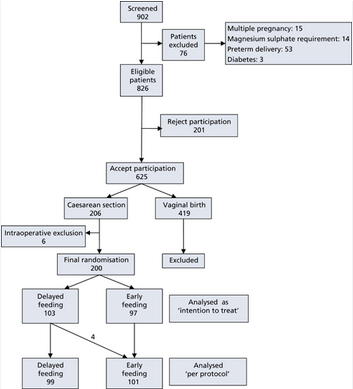Early Maternal Feeding Versus Traditional Delayed Feeding After Cesarean Section: A Pilot Study
Main Article Content
Abstract
Background: Due to improved anaesthetic, asepsis, blood transfusion, and antibiotics, caesarean sections are becoming more and more common throughout the world. The patients are typically kept off food or liquids until they pass gas. This study was conducted to determine the acceptability and tolerance of early feeding, as well as any complications or adverse effects.
Methods: In a service hospital, this comparison investigation was carried out. There were two groups of 60 patients each, one of which received early feeding, and the other of which received conventional delayed feeding as is usual in most hospitals. Other indicators and gastrointestinal effects were recorded in both groups and examined.
Results: Each alternate willing case without any exclusion criteria was assigned to a group during the study period. Early feeding was initiated 6 hours after surgery in the trial group, but it wasn't until the control group had passed the flatus. In the study group (20.8 and 33.6 h, respectively), bowel noises and flatus were present earlier than in the control group (30.9 and 48.7 h, respectively). Early feeding has no negative implications or problems.
Conclusion: There is no justification for holding or stopping all feeds as is customary. Without thinking about any negative effects, early feeding should be started. Patients recover quickly after surgery, which increases patient satisfaction and saves money.
Article Details
References
Martin JA, Hamilton BE, Ventura SJ. Births: final data for 2009.National Centre for Health Statistics. Natl Vital Stat Rep.2011;2011(60):1–60.
Hellerstein S, Feldman S, Duan T. China’s 50% cesarean sectionrate: is it too high? BJOG. 2015;122:160–5.
Kaur H, Kaur S, Sikka P. A quasi-experimental study to assessthe effect of early ambulation in post-operative recovery amongpost-cesarean mothers admitted in selected areas of NehruHospital PGIMR Chandigarh. Nurs Midwifery Res J.2015;11(1):33–42.
Liu X, Landon MB, Cheng W, et al. Cesarean delivery onmaternal request in China: what are the risks and benefits? Am JObstet Gynecol. 2015;212(6):817–22.
Masood SN, Siddiqui IA, Masood MF, et al. To assess thepractices about initiation of oral maternal feeding after cesareansection under regional anesthesia. Pak J Med Sci.2011;27(5):996–1000.
Al-Ghareeb SA, Ahmed ER, Turki HA. Effect of early oralhydration on post cesarean outcomes. J Am Sci. 2013;9(8):70–8.
Barat S, Esmaeilzadeh S, Golsorkhtabaramiri M, et al. Women’ssatisfaction in early versus delayed postcaesarean feeding: a one-blind randomized control trial study. Casp J Intern Med.2015;6(2):67–71.
Aydin Y, Altunyurt S, Oge T, et al. Early versus delayed oralfeeding after cesarean delivery under different anesthetic methods. Ginekol Pol. 2014;85:815–22.
Adeli M, Razmjoo N, Tara F, et al. Effect of early post cesareanfeeding on gastrointestinal complications. Nurs Midwifery Stud.2013;2(2):176–81.
Huang H, Wang H, He M. Early oral feeding compared withdelayed oral feeding after cesarean section: a meta-analysis.J Mater Fetal Neonatal Med. 2016;29:423–9.
Masood SN, Masood Y, Naim U, et al. A randomized comparative trial of early initiation of oral feeding versus conventionaloral feeding after cesarean delivery.Int J Gynaecol Obstet.2014;126(2):115–9.
Sumita M, Sarika G, Neerja G. Postoperative oral feeding aftercesarean section-early versus late initiation: a prospective randomized trial. J Gynecol Surg. 2010;26(4):247–50.
Razmjoo N, Adeli M, Tara F, et al. The effect of early postcesarean feeding on wound healing. Iran JNeonatal.2012;3:15–6.
Jakkaew B, Charoenkwan K. Effects of gum chewing on recoveryof bowel function following cesarean section: a randomizedcontrolled trial. Arch Gynecol Obstet. 2013;288(2):255–60.

